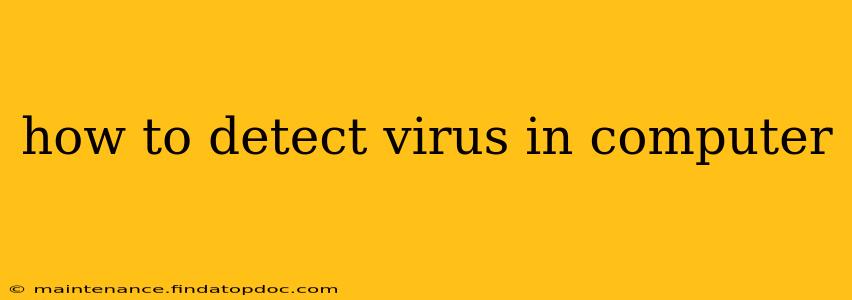Computer viruses can wreak havoc, from slowing down your system to stealing your personal data. Knowing how to detect them is crucial for protecting yourself. This guide will equip you with the knowledge and tools to identify and address potential viral infections on your computer.
What are the Signs of a Computer Virus?
Before diving into detection methods, let's understand the tell-tale signs of a viral infection. These symptoms can vary depending on the type of virus, but some common indicators include:
- Slow performance: Noticeably slower boot times, sluggish application loading, and general system lag are often early warning signs.
- Unusual pop-ups: Unexpected advertisements or warnings appearing frequently, even when you're not browsing the web, are suspicious.
- Programs crashing or freezing: Applications unexpectedly closing or freezing without apparent reason could indicate a viral infection.
- Changes to your desktop: New icons, shortcuts, or toolbars appearing without your consent are red flags.
- Files disappearing or being corrupted: Important files becoming inaccessible or altered without your knowledge is a major cause for concern.
- High disk or CPU usage: Constantly high resource utilization, even when you're not running demanding programs, is often indicative of a malicious process.
- Strange network activity: Your computer might be sending data unexpectedly, leading to increased internet usage or slower connection speeds.
How to Scan for Viruses?
Now that you know the warning signs, let's explore various ways to scan for viruses.
1. Using Built-in Antivirus Software
Most operating systems (Windows, macOS, etc.) include basic antivirus protection. While not as robust as dedicated antivirus suites, they provide a first line of defense. Regularly running a scan with your system's built-in tools is a good practice. Learn how to access and utilize the security features built into your operating system.
2. Employing Dedicated Antivirus Software
Dedicated antivirus software offers more comprehensive protection. Popular options include Norton, McAfee, Bitdefender, and Avast. These programs offer real-time protection, scheduled scans, and advanced features to detect and remove malware. Choose a reputable antivirus program and install it; keeping it updated is critical for effective virus detection.
3. Running Malware Scans from Multiple Sources
For a more thorough check, consider using multiple antivirus programs. Different programs utilize different detection methods, so combining them can improve the chances of catching any lurking malware. Remember that only use reputable anti-malware programs from trusted sources.
4. Manual File Checks
While not a comprehensive solution, manually checking suspicious files can be helpful. If you notice unusual files or folders, right-click and examine their properties. Look for unusual file sizes or modification dates that don't align with your typical activity.
What to Do if You Detect a Virus?
If your scan reveals a virus, take immediate action:
- Isolate the infected computer: Disconnect the computer from the network to prevent further spreading.
- Run a full system scan: Use your antivirus software to conduct a complete scan of the system.
- Follow the antivirus instructions: Adhere to any prompts or recommendations from your antivirus software.
- Quarantine or remove infected files: Your antivirus program will usually offer options to quarantine or remove detected threats.
- Update your software: Ensure your operating system and all applications are up to date with the latest security patches.
- Change passwords: If you suspect data theft, change all your online passwords immediately.
- Consider professional help: If you're unable to remove the virus yourself, seek professional help from a computer technician.
Frequently Asked Questions (FAQs)
How often should I scan my computer for viruses?
The frequency of scans depends on your risk level. For average users, weekly scans are generally sufficient. If you frequently download files from untrusted sources or visit suspicious websites, more frequent scans are recommended.
Can I remove a virus myself, or should I always call a professional?
Many common viruses can be removed using reputable antivirus software. However, if the virus is particularly persistent or you're uncomfortable with technical troubleshooting, seeking professional help is advisable.
What are some preventive measures to avoid viruses?
Preventive measures are crucial. These include installing and keeping your antivirus software updated, being cautious about downloading files from untrusted sources, regularly updating your software, avoiding suspicious websites and emails, and using strong passwords.
By following these steps and maintaining vigilance, you can significantly reduce your risk of computer virus infections and protect your valuable data. Remember, prevention is always better than cure!
